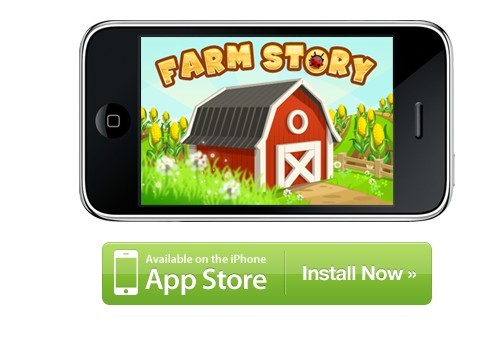游戏推介:TeamLava推出iPhone城市建设游戏City Story
TeamLava的员工们正在扩展他们支持的社交设备种类,此次推出的新款城市建设游戏City Story同时支持iPhone和iPad。
适应了许多技术对Farm Story的要求,City Story和它的Facebook版本比较类似。尽管与Playdom的Social City极其相似,City Story还是认为自己比Facebook上一些应用具有更大社会潜力。目前为止,它已经取得的成功在于:它在苹果免费应用程序列表的iPad应用排行上排名第二,iPhone应用排行上排名第五。但由于低进展曲线导致的一些不幸的事件,City Story距离一个完美的游戏还有很长的一段路要走。
跟所有的城市建设者一样,City Story游戏的目标在于创造一个繁荣、兴旺的城市。除了它在移动设备上进行之外,游戏的核心与别的版本并无不同。一个城市成功与否主要取决于两个因素:人口和幸福指数。
这两个指标可以通过三个主要的建筑类型来达到:住宅、商业建筑和装饰性建筑。可以想见,住宅提高了城市的人口。人口越多,幸福指数的需求就越高,而幸福指数来自于商业建筑(比如学校、咖啡厅、商店)和装饰性建筑(比如公园和道路)。当玩家升级之后,更多更有效的建筑物将解锁。
然而,关于人口和幸福指数的问题是:人们似乎并没有任何真实的理由来关心其中任何一项数据。如果幸福度非常低,人口可能就无法增加,但是由于游戏的一开始的难度很低,发展很容易,所以这样的问题并没有出现过。
另外,当一个建筑物被购置之后,它的价值好像已经被设定了,没有更多的后续作用。在Social City里,每幢房子都能持续地增加人口数量而商业建筑则可以产生一小部分的收入。而在没有足够的幸福指数之前,住宅和商店都无法建造。但City Story的模式并非如此。
在City Story中,所有的收入都来源于满足工厂的订单。完成订单将需要一段时间(几分钟到几天不等),而且如果完成之后不“收获”的话,订单就会终结。玩家升级之后可以建造更多工厂,而且也将有获利更多的订单出现。
尽管收入在游戏中很重要,但它似乎早就失去了意义。一开始,玩家就拥有了一些适量的土地来建造房屋,还有多得不可思议的启动资金!这就预示着一个后续问题。在不到15分钟的时间里,玩家就可以将整个虚拟土地填充满,而且看起来很不错。这样的话,似乎并没有什么东西可以继续争取和奋斗了。
通过解锁扩展功能,这个潜在的缺陷可以稍微被缓解。但是那时启动资金已经差不多用完了,而工厂的收入将需要一段时间,这样玩家就几乎无事可做。最后,玩家只能扩展自己虚拟货币、游戏中的货币和邻居的数量。幸运的是,因为玩家可以与整个社区的用户进行互动,而且在创建了Storm8的ID之后,玩家可以添加任何人成为自己的邻居,所以在City Story里邻居并不难得到。
当然,如果玩家不希望随机地添加别人到邻居中,City Story的社交特点同样引人注目,因为玩家可以访问任何一个人的城市,并帮助他们清理垃圾,一天可以清理五个建筑物(如果是邻居的话可以清理十个)。被帮助的玩家将收到收入和经验的奖励,此外帮助人的玩家也将增加星级。
就像在Farm Story一样,当玩家访问游戏的社交页面时,一个随机的玩家列表就会出现以供访问。玩家的星级越高,他出现在这个列表前排的可能性就越大,而这可以更有效地提高一个人在游戏里的等级。除了这些,玩家还可以给其他玩家发送消息或者留言。
似乎现在的City Story中社交的元素还不够多,因此游戏还与Facebook进行了连接。用户可以对自己或者别人的城市拍照,不仅可以保存到自己的移动设备中,还可以发布到社交网络上。
总的来说,City Story不是一个坏游戏,当玩家建造自己城市的时候,他在视觉上有相当的令人满意。但不幸的是,游戏在一开始的时候进展太容易导致游戏的可玩性过早地被耗尽。老实说,当空间被填满的时候,游戏就会变得无趣。尽管游戏的社交特征很惊人,但我们怀疑这是否足够使它成为一个好游戏。(译者:杨雅)
TeamLava Launches City-Building App, City Story, on the iPhone
The folks at TeamLava are expanding their repertoire of social iDevice titles with the recent launch of their new city-builder, City Story, for both the iPhone and iPad.
Adapting many of the mechanics found it the developer’s popular Farm Story application, City Story also resembles its Facebook counterparts. But despite being quite similar to games like Playdom’s Social City, City Story feels like it has even greater social potential than some Facebook games. It has succeeded so far on those merits, being the current #2 app on Apple’s top free iPad app list, and #5 for the iPhone. All the same, it’s far from a perfect game, with some unfortunate issues stemming from a very low progression curve.
Like all city-builders, the object of the game is to create a thriving, bustling city. The core game play is no different than any other social version, save being on a mobile device. The success of one’s city is broken up into two major elements: Population and Happiness.
These two statistics translate into three major types of structures that can be created: residences, businesses, and decorations. As one would expect, residences build up one’s populace. The higher the population, the more happiness is required, which comes from businesses like schools, cafes, and shops, as well as decorative elements such as parks and roads. Larger, more effective buildings will also become available as players level up.
The big issue with this population vs happiness mechanic, however, is there does not appear to be any real reason to concern oneself with either stat. It is possible that one would be unable to increase population should happiness be too low, but due to a very low difficulty/progression curve, the issue never presented itself. Also, once a building is placed, its value appears to be set, with no forward effect. In Social City, every house continually produced more population while businesses produced small amounts of income. However, the former could not be done without enough happiness. That does not appear to be the case here
In City Story all revenue stems from contracts, fulfilled at factory structures, that take a period of time (a few minutes to a few days) to complete and will expire if not “harvested,” so to speak, after they finish. Moreover, as one levels up, more factories will be available for construction and better, more lucrative, contracts as well.
Despite the importance of revenue in the game, it’s almost pointless early on. When starting out, players are given a moderate amount of land in which to build upon, as well as an almost absurd amount of starting money. This suggests a progression problem. In less than 15 minutes or so, it was possible to fill the entire virtual space with structures and décor and still make it look quite good. At that point, there was nothing more to really strive for.
This potential flaw is mitigated slightly by unlocking expansions, but by then, starting money is more or less gone, and factory income will take some time, leaving users with the very little to do.
Eventually, the players will only be able to expand with virtual currency or the use of in-game money and a set number of neighbors. Luckily, neighbors aren’t hard to come by in City Story, as players can interact with the whole of the community, and after creating a Storm8 ID, can add any other players as neighbors.
Of course, if players don’t wish to add random people as neighbors, the social features of City Story still shine, for they can visit any other person’s city and help them out by cleaning up to five buildings a day (10 if they are a neighbor). For the player being helped out, they will receive a claimable bonus to income and experience, Additionally, helping others out will also earn the user Star Ratings.
Like in Farm Story, when players visit the social tab of the game, a list of random individuals appear that can be visited. The higher one’s Star Rating, the higher the chance that they will appear first in that list, effectively improving one’s growth in the game. In addition to this, players can also send messages and comment on each others’ walls within the app.
As if there were not enough social elements to City Story already, the game also has Facebook Connect integrated into it. With it, users can take photographs of their and other users’ cities and not only save them to their iDevice, but post them to the social network as well.
Overall, City Story is not a bad game, with a design that’s quite visually satisfying when one builds up their city. Unfortunately, it is so easy to progress early on that it’s easy to feel that the game’s possibilities have been prematurely exhausted. Honestly, it just gets boring once the space is full, and while the social features of the app are phenomenal, we wonder whether or not that will be enough.(source:inside social games)








































 闽公网安备35020302001549号
闽公网安备35020302001549号